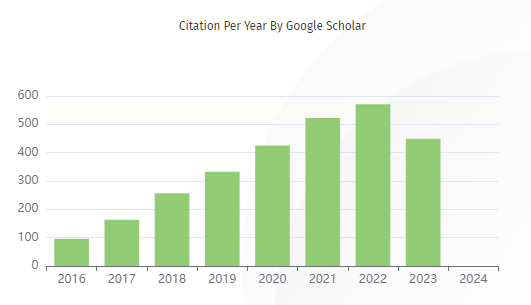Pengaruh Budaya Organisasional Terhadap Intention to Leave Dimediasi Kepuasan Kerja Karyawan Kontrak Universitas Muhammadiyah di Yogyakarta
DOI:
https://doi.org/10.12695/jmt.2020.19.1.1Keywords:
Budaya Organisasional, Kepuasan Kerja, Intention to Leave, Turnover, Structural Equation ModelingAbstract
Abstrak. Penelitian ini bertujuan untuk menganalisis pengaruh budaya organisasional dan kepuasan kerja terhadap intention to leave pada karyawan kontrak Perguruan Tinggi Muhammadiyah di Yogyakarta. Metode yang digunakan adalah metode probability sampling dengan jumlah sampel sebanyak 117 responden. Analisis Structural Equation Modelling (SEM) dengan software AMOS 22 dan statistik deskriptif SPSS 15 menunjukkan hasil penelitian budaya organisasional berpengaruh negatif terhadap intention to leave, budaya organisasional berpengaruh positif terhadap kepuasan kerja, dan kepuasan kerja berpengaruh positif terhadap intention to leave.
Kata kunci: Budaya organisasional, intention to leave, turnover, kepuasan kerja, structural equation modeling
Abstract. The purpose of this study was to analyze the influence of organizational culture and job satisfaction on intention to leave on contract employees of Muhammadiyah Universities in Yogyakarta. The method used is the probability sampling method with a sample size of 117 respondents. Analysis of Structural Equation Modeling with AMOS 22 software and descriptive statistics SPSS 15 shows the results of organizational culture research have a negative effect on the intention to leave, organizational culture has a positive effect on job satisfaction and job satisfaction has a positive effect on the intention to leave.
Keywords: Organizational culture, intention to leave, turnover, job satisfaction, structural equation modeling
Downloads
References
Al-Sada, M., Al-Esmael, B., & Faisal, M. N. (2017). Influence of organizational culture and leadership style on employee satisfaction, commitment and motivation in the educational sector in Qatar. EuroMed Journal of Business, 12(2), 163–188. doi: 10.1108/EMJB-02-2016-0003
Alonderiene, R., & Majauskaite, M. (2016). Leadership style and job satisfaction in higher education institutions. International Journal of Educational Management, 30(1), 140–164.
Azanza, G., Moriano, J. A., Molero, F., & Mangin, J.-P. L. (2015). The effects of authentic leadership on turnover intention. Leadership and Organization Development Journal, 36(8), 955–971. doi: 10.1108/LODJ-05-2014-0090
Bigliardi, B., Dormio, A. I., Galati, F., & Schiuma, G. (2012). The impact of organizational culture on the job satisfaction of knowledge workers. Vine, 42(1), 36–51. doi: 10.1108/03055721211207752
Chang, C., & Chang, W.-C. (2008). Internal Marketing Practices and Employee s ' Turnover Intentions in Tourism and Leisure Hotels. The Journal of Human Resource and Adult Learning, 4(2), 161–172.
Cronley, C., & Kim, Y. (2017). Article information : Intentions to Turnover : A Moderated Mediated Model. Leadership & Organization Development Journal, 38(2). doi: 10.1108/LODJ-10-2015-0227
Denison, D. R. (2000). Organizational Culture: Can it be a Key Lever for Driving Organizational Change. In S. Cartwright & C. Cooper (Ed.), The Handbook of Organizational Culture. London: John Wiley and Sons Ltd.
Ebert, R. J., & Griffin, R. W. (2017). Business Essentials. England: Pearson Education Limited. doi: 10.1201/b12111-26
Gatling, A., Kang, H. J. A., & Kim, J. S. (2016). The effects of authentic leadership and organizational commitment on turnover intention. Leadership and Organization Development Journal, 37(2), 181–199. doi: 10.1108/LODJ-05-2014-0090
Ghozali, I. (2014). Structural Equation Modelling, Metode Alternatif dengan Partial Least Square (PLS). Edisi 4. Semarang: Badan Penerbit Universitas Diponegoro.
Gómez-Mejía, L. R., Balkin, D. B., & Cardy, R. L. (2010). Managing human resources (6 ed.). New Jersey: Pearson Education, Inc.
Gyensare, M. A., Anku-Tsede, O., Sanda, M.-A., & Okpoti, C. A. (2016). Transformational leadership and employee turnover intention. World Journal of Entrepreneurship, Management and Sustainable Development, 12(3), 243–266. doi: 10.1108/wjemsd-02-2016-0008
Harnoto. (2002). Manajemen Sumber Daya Manusia. Jakarta: Prehallindo.
Haryono, S. (2017). Metode SEM Untuk Penelitian Manajemen AMOS LISREL PLS. Jakarta : Luxima Metro Media.
Hasibuan, M. S. P. (2013). Manajemen Sumber Daya Manusia. Jakarta: Bumi Aksara.
Liden, R. C. & Maslyn, J. M. (1998). Multidimensionality of Leader-member Exchange: An Empirical Assessment through Scale Development. Journal of Management, 24 (1), 43-72.
Liu, Z., Cai, Z., Fang, Y., Li, J.,& Shi, S. (2013). Leadership style and employee turnover intentions: A social identity perspective. Career Development International, 18(3), 305–324. doi: 10.1108/CDI-09-2012-0087
Lok, P., & Crawford, J. (2004). The effect of organisational culture and leadership style on job satisfaction and organisational commitment: A cross-national comparison. Journal of Management Development (Vol. 23). https://doi.org/10.1108/02621710410529785
Lund, D. B. (2003). Organizational culture and job satisfaction. International Review of Management and Marketing, 18(2), 219–236. doi: 10.1108/0885862031047313
Luthans, F. (2011). Organizational Behavior : An Evidence-Based Approach. Annual editions,. New York: McGraw-Hill Companies, Inc.
MacIntosh, E. W., & Doherty, A. (2010). The influence of organizational culture on job satisfaction and intention to leave. Sport Management Review, 13(2), 106–117. doi: 10.1016/j.smr.2009.04.006
Mathis, R. L., & Jackson, J. H. (2010). Human Resource Management. South-Western: Cengage Learning.
Nokeilainen, Petri. (2009). Structural equation modelling with AMOS. Finland : Research Centre for Vocational Education University of Tampere.
Oh, J., & Oh, S. (2017). Authentic leadership and turnover intention: does organizational size matter? Leadership and Organization Development Journal, 38(7), 912–926. doi: 10.1108/LODJ-08-2016-0209
Omeluzor, S. U. (2018). Organizational Culture Variables As Factors Influencing Librarians' Turnover Intentions in University Libraries in South-South and South-East of Nigeria. Library Philosophy and Practice, (February), 1–16.
Paula C. Morrow, Yoshinori Suzuki, Michael R. Crum, Robert Ruben, Gregory Pautsch. (2005). The role of leader‐member exchange in high turnover work environments. Journal of Managerial Psychology, 20 (8), 681-694, doi: 10.1108/02683940510631444
Peter, J. J., & Troth, A. (2011). Emotional intelligence and leader member exchange: The relationship with employee turnover intentions and job satisfaction, Leadership & Organization Development Journal, 32 (3), 260-280, doi: 10.1108/01437731111123915
Puangyoykeaw, K., & Nishide, Y. (2015). Organizational commitment and turnover intention in low-skilled immigrant workers in thailand: an empirical assessment of need satisfaction, job satisfaction and overall life satisfaction factors. International Journal of Business and Management, 10(5), 98–112. doi: 10.5539/ijbm.v10n5p98.
Purwanto, D. (2011). Komunikasi Bisnis (4 ed.). Jakarta: Erlangga.
Putra, M. F. R. (2017). Pengaruh kepuasan kerja dan komitmen organisasi terhadap intention to leave di rumah sakit pura raharja surabaya. Jurnal Administrasi Kesehatan Indonesia, 5(2), 99–104.
Rad, A. M. M., & Yarmohammadian, M. H. (2006). A study of relationship between managers' leadership style and employees' job satisfaction. Leadership in Health Services, 19(2), 11–28.
Robbins, S. P., & Judge, T. A. (2008). Perilaku organisasi. Jakarta: Salemba Empat.
Robbins, S. P., & Judge, T. A. (2011). Perilaku organisasi. Jakarta: Salemba Empat.
Sekaran, U., & Bougi, R. (2013). Research methods for business. United kingdom : Jhon Wiley & Sons Ltd
Shareef, R. A., & Atan, T. (2018). The influence of ethical leadership on academic employees organizational citizenship behavior and turnover intention: Mediating role of intrinsic motivation. Management Decision. doi: 10.1108/MD-08-2017-0721
Silalahi, U. (2012). Metode penelitian sosial. Bandung: Refika Aditama.
Simamora, B. (2002). Panduan riset perilaku konsumen. Jakarta : PT Gramedia Pustaka Utama.
Solimun. (2002). Structural equation modeling LISREL dan Amos. Malang : Fakultas MIPA Universitas Brawijaya.
Sugiyono. (2016). Metode penelitian kuantitatif, kualitatif dan r&d. Bandung: Alfabeta.
Thoha, M. (2015). Perilaku organisasi: konsep dasar dan aplikasinya. Jakarta: Rajawali Pers.
Tjahjono, H. (2011). Culture based leadership. Jakarta: Gramedia Pustaka Utama.
Wibowo. (2011). Manajemen kinerja. Jakarta: Rajawali Press.
Widjaja, D. C., Fulbertus, M., & Kusuma, F. (2008). Analisis persepsi employee empowerment terhadap employee turnover intention di hotel x, Kupang, Nusa Tenggara. Jurnal Manajemen Perhotelan, 4, 72–84.
Downloads
Submitted
Accepted
Published
How to Cite
Issue
Section
License

This work is licensed under a Creative Commons Attribution-NonCommercial-ShareAlike 4.0 International License. Copyright @2023. This is an open-access article distributed under the terms of the Creative Commons Attribution-NonCommercial-ShareAlike 4.0 International License (http://creativecommons.org/licenses/by-nc-sa/4.0/) which permits unrestricted non-commercial used, distribution and reproduction in any medium.

















